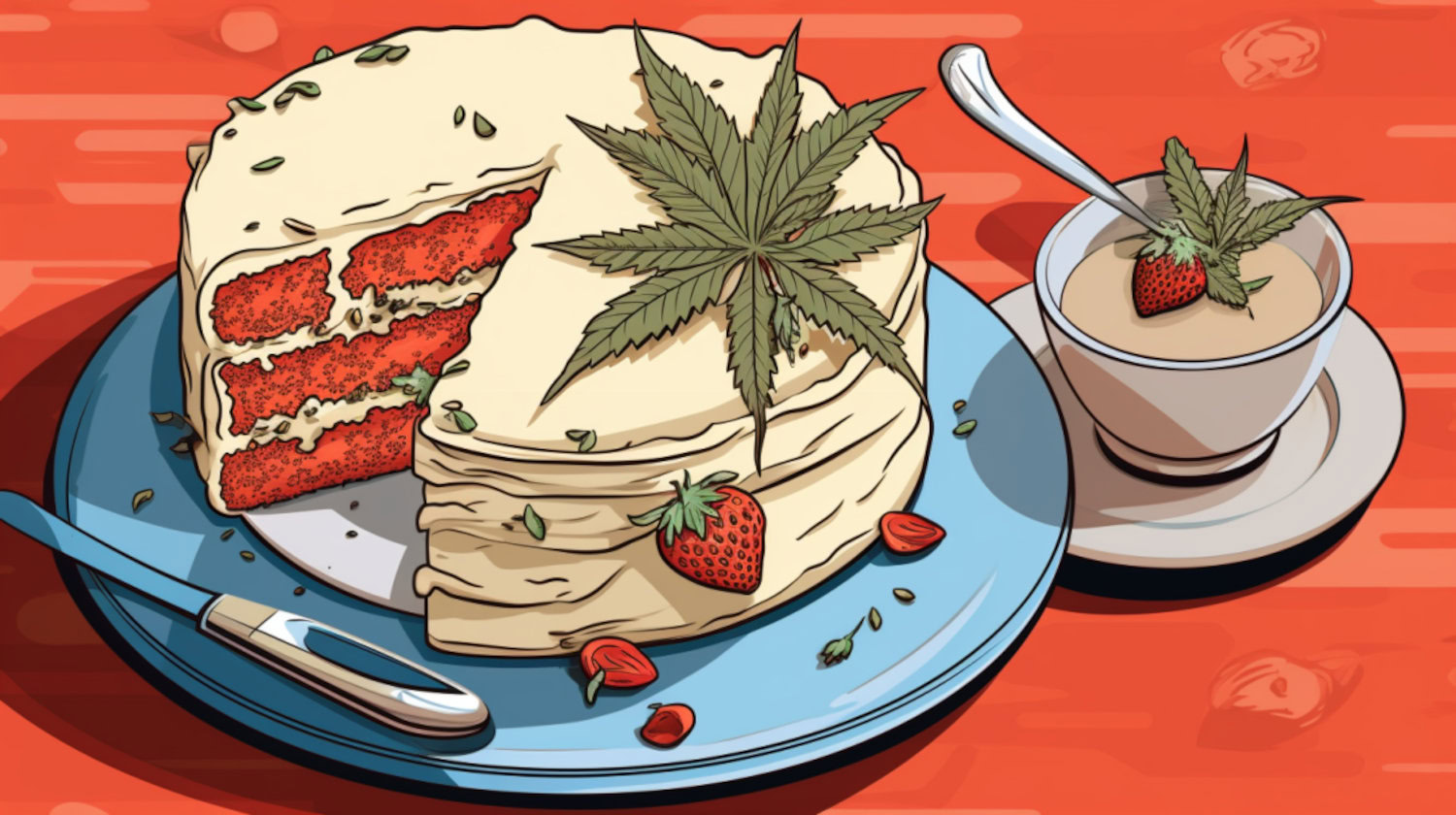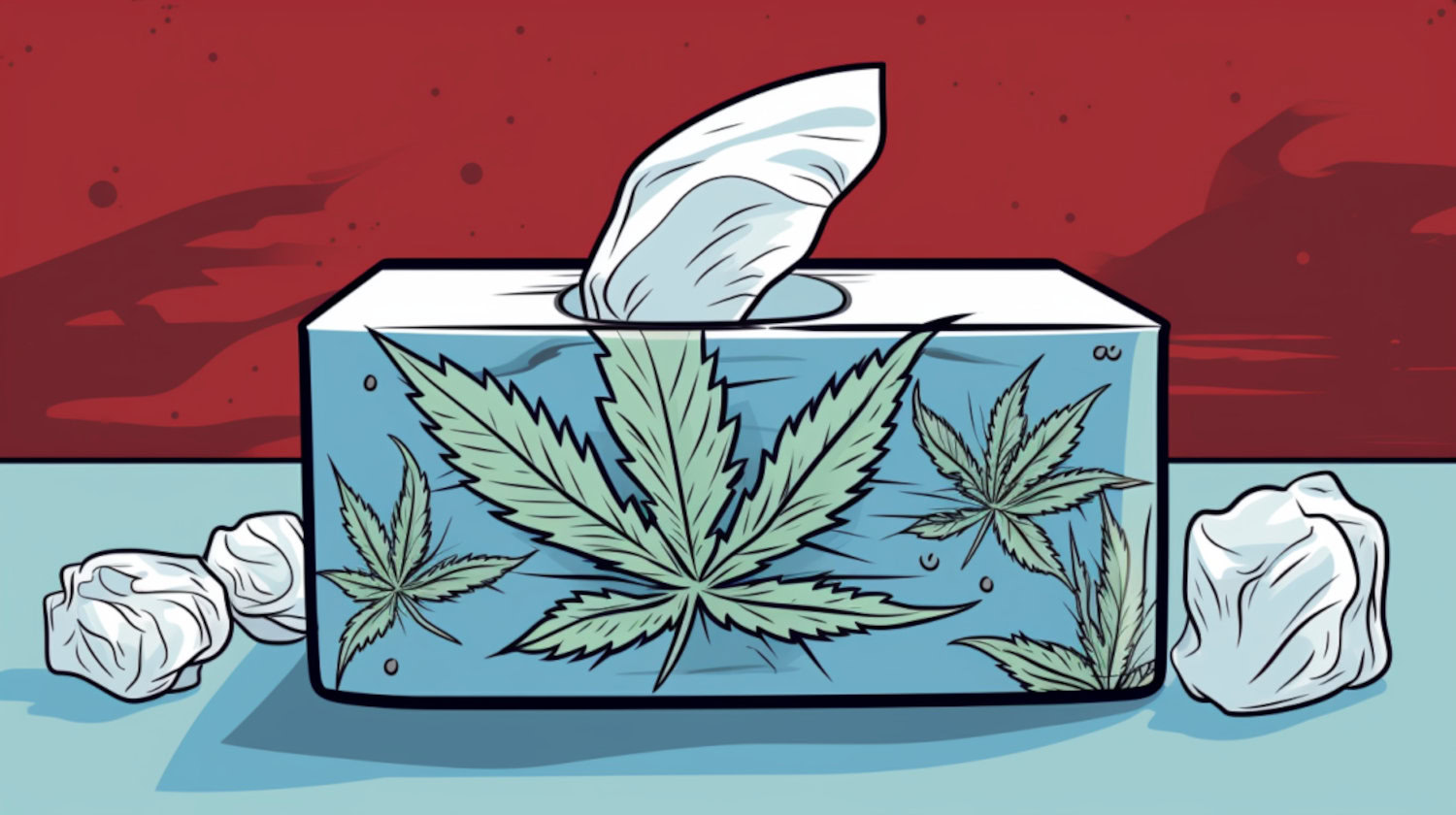Key Takeaways
- Cannabis allergy may be to blame, but allergies to cannabis itself are actually quite rare.
- Many edibles contain common allergens, like eggs, nuts, dairy, and gluten.
- Don’t take unnecessary risks. Try limited ingredient edibles at a low dose, and/or talk to a medical cannabis doctor.
There are over 170 foods known to cause allergic reactions, like itchy throats and skin in consumers. But can weed make you itchy? That's exactly what people asking, "Why do edibles make me itch?" want to know.
Though cannabis allergies are exceedingly rare, they do exist. So, while some people may be allergic to the plant itself, edibles present a variety of variables that could be triggering that irritating itch. From the variety of ingredients to residues from the manufacturing process, it can be difficult to untangle the source of the itch.
What are Edibles?
The main ingredient that makes edibles what they are is cannabis. The market is crammed with baked goods, chocolates, gummies, tablets, and beverages.1
Consumers who want to control their dosage and strain choice may even produce cannabis edibles from home, as opposed to buying in commercial dispensaries. Based on anecdotal reports, consumers prefer edibles for the discretion and convenience they provide and reduced health risks when compared to smoking. However, scientific evaluation of the accuracy of these views is ongoing.
Whatever the strain, edibles release their effects via a metabolic process that takes between 30 minutes and two or more hours. Cannabinoids like THC and CBD embark on a journey toward your stomach and liver before the intestinal walls absorb them. At this stage, the cannabinoids enter the bloodstream to the CB1 and CB2 receptors (depending on which cannabis compound you ingest) in the brain.
Edibles are reported to deliver benefits, such as reduced symptoms of chronic illness. Types of products that fall under the edibles category include gummies, cakes, and candies. Consumers can make their own edibles by purchasing or growing flower and decarbing it before melting it with a carrier oil like coconut oil and baking it into a normal recipe.
The effects of edibles vs. smoking are 6-8 hours vs 1-4 hours. The effects of smoking can typically be felt for around the same amount of time as vaping. Although tinctures may release their effects over 2-8 hours, the sweet spot is usually in the range of six hours, making edibles the best choice for longer-lasting effects.2
Edibles Make Me Itch, But What Typically Makes People Itchy?

Itchiness is an irritating skin sensation that transpires when signals transmit from the skin to the spinal cord's nerve cells. Various rodent studies paint a picture of what happens inside the body when itching occurs, with scientists learning that neuropeptides — small neuron-produced proteins responsible for sending "itching" signals — vary based on whether or not the itch is associated with histamine release.
Interestingly, transient receptor potential vanilloid type 1 (TRVP) channels contribute to the skin barrier's formation and preservation. Itching may occur when the skin barrier becomes inflamed or broken. Bleeding and cracking are some additional repercussions caused by excessive itching.
TRPs play a role in the skin's immunity and inflammation modulation. This is worth mentioning since TRVP channels in the skin may be influenced by various cannabinoids and terpenes.
If it's not a typical case of someone getting under your skin, your itchiness may be the result of many different things. For example, something you ate may be causing itchy skin. Foods can spur on immunoglobulin E-mediated hypersensitivity reactions with rapid onset or may prompt late eczematous reactions.3
Asthma, eczema, and hay fever are some common allergies that cause itchy skin. Certain food allergies may also cause itchiness, including:
- Eggs
- Milk
- Fish
- Shellfish
- Peanuts
- Tree nuts
- Fruits
Active cannabinoids may be capable of powering on and off skin nerves to reduce itchiness. Additionally, cannabinoids may positively influence the primary skin cells in the upper skin layer (keratinocytes) and mast cells (MCs) that initiate immune responses via CB1, CB2, or TRP pathways.
Don't hesitate to seek medical assistance if you are suffering from an allergic reaction, particularly if the allergy sparks excessive swelling of the tongue, impacting the ability to breathe or swallow properly.
Can Weed Make You Itchy?
Breathing or inhaling cannabis allergens may tickle the nose hairs, resulting in nasal allergy symptoms, such as a runny nose, sneezing, or a blocked nose. Ocular eye allergy symptoms, such as red eye irritation, swelling, or watery eyes, are also common among cannabis allergy sufferers. However, it's important to note that cannabis allergies are rare, with just an estimated 0.3% of people affected.
Some other common signs of a cannabis allergy include respiratory symptoms, such as shortness of breath and wheezing. There is also a risk of anaphylaxis, but this is rare. Swelling of the throat, vomiting, fainting, dizziness, low blood pressure, weak/rapid pulse, and itchy and flushed skin may indicate anaphylaxis, which can result in death or coma if left untreated. Several researchers uncovered a number of cases where anaphylaxis responses were associated with cannabis when ingested, inhaled, or injected.
Studies assessing cannabis allergy symptoms confirm that the plant may irritate the skin in several ways.4 Researchers note that reactions to coming in contact with cannabis may include:
- Contact dermatitis
- Hives
- Itchiness
- Inflammation or redness of the skin
Further Research
A separate team of Brazilian researchers focused on four women, three of whom did not have any comorbidities and one diagnosed with diabetes. Each of the female study participants suffered skin rashes after CBD consumption, between six hours and 11 days after starting the CBD treatment.
The study's primary goal was to determine the efficacy of CBD's anxiety-reducing effects in healthcare frontline workers amid the COVID-19 pandemic. An isolated oral CBD (99.6% pure) solution combined with medium-chain triglyceride oil (150 mg/ml) was administered twice daily at a total daily dosage of 300 mg (150 mg twice per day) for one month. Since the female study subjects were using no other medications — making this the first case of its kind — the researchers clarified that the skin irritation was notably associated with CBD use.5
Although cannabis has been linked to skin itchiness, it also demonstrates promise as an anti-inflammatory in some studies. Specifically, CBD may exert soothing effects and can be applied topically for potential localized relief from irritation.
Cannabis joins a long list of plant and weed allergens, such as birch pollen and ragweed. Currently, there is a lack of research on this subject area, and a European research effort conducted in 2015 highlighted the rise in cannabis allergy cases.6
An additional report emphasized that cannabis may pose a health hazard and a rash from edibles is possible.7
What Research Hopes to Find
Research may also indicate the support of medical cannabis use for patients with chronic itch. The endocannabinoid system is a potential key regulator in a number of bodily processes, including in diseases like atopic dermatitis and chronic pruritus. THC and CBD interact with the CB1, CB2, and TRPV channels in various ways that promote systemic changes in the body. This process can result in decreased inflammation. Consequently, skin sensations (including itchiness and irritation) can begin to dwindle.8
Patient success stories lend credit to the theory that cannabinoids harbor anti-inflammatory potential. One story of a woman in her 60s who was suffering from chronic pruritus or intensely itchy skin and was unable to find a suitable medication that helped resolve her symptoms. Doctors advised smoking cannabis twice weekly, with a successful outcome and the patient reporting instant symptomatic relief. The plant's skin-soothing properties were so effective the patient now only consumes cannabis for her condition and has stopped taking all other prescribed medications.9
A 2015 study published in the journal Annals of Allergy, Asthma, and Immunology underlines the importance of consuming cannabis cautiously. Specifically, it alerted people with allergies that they may endure eye swelling/puffiness, itchiness/hives.
Their research report also drew attention to a potential root cause of cannabis-related itchiness, with one patient reporting an allergic reaction after consuming hemp seed-smeared seafood. The reaction was so intense that the patient required antihistamines and an epinephrine shot, an urgent form of treatment for potentially fatal allergic reactions, such as anaphylaxis. Follow-up tests revealed that the patient did not have a seafood allergy. Instead, the cannabis plant's hemp seeds ignited the itchiness.10
Other Ingredients That Could Cause a Reaction

Since the majority of edible cannabis products contain cannabinoids and base ingredients or additives such as oils and flavorings, there is a possibility that you might encounter allergens beyond the plant itself. Various ingredients in edibles could be the culprit of an allergic reaction to THC edibles, such as
- Tree nuts
- Peanuts
- Fish
- Shellfish
- Dairy
- Soy
- Eggs
- Gluten
When opting for a topical cannabinoid solution, reading what's on the label is equally important. A handful of commonly used skin care and cosmetic ingredients may cause allergic contact dermatitis, including
- Alpha hydroxy acids
- Beta hydroxy acids
- Diethanolamine
- Chemical fragrances
- Latex
- Parabens
- Per and poly-fluoroalkyl substances (PFAS)
Dry mouth may also spur on itchiness but is usually avoidable with proper hydration and accurate dosing. Dry mouth (Xerostomia) happens when salivary glands don't produce sufficient saliva. It may occur due to side effects caused by other types of medication, so consult with a doctor before consuming cannabis edibles if you are already using other OTC meds, including bronchodilators, antihistamines, and some diuretics.
Don't worry too much if you are an allergy sufferer because feeling anxious may even cause extra itchiness.11 You should be able to breathe a sigh of relief knowing that cannabis edibles manufacturers and suppliers must package and produce their products following state labeling requirements. Products must explicitly state the disclosure and identification of common allergens that might be present.
Avoiding Allergic Reactions to THC Edibles
Taking preventive measures is the most reliable way of preventing allergies, not just from cannabis but from any sensory-disturbing substance. The Asthma and Allergy Foundation of America (AAFA) notes the importance of carrying your epinephrine auto-injectors 24/7 if you are at risk of anaphylaxis.
To enjoy edibles responsibly, avoiding products containing certain foods that may fire up your allergies, like certain cooking oils, wheat flour, or milk, is advisable. Starting with a small dose of cannabis and noting the effects is the best way to distinguish between a cannabis allergy and a food allergy.
Can CBD Help Allergies and Itchiness?
The subject of CBD and allergies is slightly complex, with some research suggesting that it may cause itchiness and others saying that the therapeutic cannabinoid can dampen allergy symptoms.
Various consumers will recommend the use of topical cannabis for pain relief, skin dryness, eczema, and inflammation. However, everyone is different, and results vary.
Many OTC-sold topical preparations may contain allergens and certain botanicals that can cause immunologic contact urticaria and ACD. Consumers should consider looking at the labeling for lab tests and reviewing research to discuss with a doctor if they are concerned about skin allergies.9
Don't hesitate to seek professional help if you notice any signs of an allergic reaction. If you are struggling with a specific type of condition that you think medical cannabis edibles may help with, a certified medical cannabis doctor, such as NuggMD's qualified team of doctors, may be able to help.
References
- Barrus DG, Capogrossi KL, Cates SC, et al. Tasty THC: Promises and Challenges of Cannabis Edibles. Methods Rep RTI Press. 2016;2016:10.3768/rtipress.2016.op.0035.1611. doi:10.3768/rtipress.2016.op.0035.1611 ↩︎
- MacCallum CA, Russo EB. Practical considerations in medical cannabis administration and dosing. European Journal of Internal Medicine. 2018;49(49):12-19. doi:https://doi.org/10.1016/j.ejim.2018.01.004 ↩︎
- Katta R, Schlichte M. Diet and dermatitis: food triggers. J Clin Aesthet Dermatol. 2014;7(3):30-36. ↩︎
- Skypala IJ, Jeimy S, Brucker H, et al. Cannabis-related allergies: An international overview and consensus recommendations. Allergy. 2022;77(7):2038-2052. doi:10.1111/all.15237 ↩︎
- Souza JDS, Fassoni-Ribeiro M, Batista RM, et al. Case Report: Cannabidiol-Induced Skin Rash: A Case Series and Key Recommendations. Frontiers in Pharmacology. 2022;13. doi:https://doi.org/10.3389/fphar.2022.881617 ↩︎
- Decuyper I, Ryckebosch H, Van Gasse AL, et al. Cannabis Allergy: What do We Know Anno 2015. Archivum Immunologiae et Therapiae Experimentalis. 2015;63(5):327-332. doi:https://doi.org/10.1007/s00005-015-0352-z ↩︎
- Decuyper I, Ryckebosch H, Van Gasse AL, et al. Cannabis Allergy: What do We Know Anno 2015. Archivum Immunologiae et Therapiae Experimentalis. 2015;63(5):327-332. doi:https://doi.org/10.1007/s00005-015-0352-z ↩︎
- Martins AM, Gomes AL, Vilas Boas I, Marto J, Ribeiro HM. Cannabis-Based Products for the Treatment of Skin Inflammatory Diseases: A Timely Review. Pharmaceuticals. 2022;15(2):210. doi:https://doi.org/10.3390/ph15020210 ↩︎
- Roh YS, Sutaria N, Biles NF, Kwatra SG. Treatment of Chronic Pruritus With Medical Marijuana. JAMA Dermatol. 2021;157(7):879–880. doi:10.1001/jamadermatol.2021.1194 ↩︎
- Ocampo TL, Rans TS. Cannabis sativa: the unconventional “weed” allergen. Annals of Allergy Asthma & Immunology. 2015;114(3):187-192. doi:https://doi.org/10.1016/j.anai.2015.01.004 ↩︎
- Sanders KM, Akiyama T. The vicious cycle of itch and anxiety. Neurosci Biobehav Rev. 2018;87:17-26. doi:10.1016/j.neubiorev.2018.01.009 ↩︎
The information in this article and any included images or charts are for educational purposes only. This information is neither a substitute for, nor does it replace, professional legal advice or medical advice, diagnosis, or treatment. If you have any concerns or questions about laws, regulations, or your health, you should always consult with an attorney, physician or other licensed professional.




